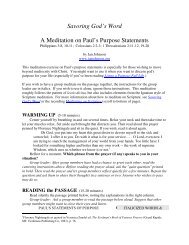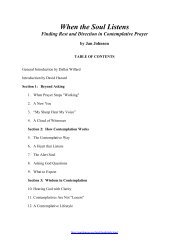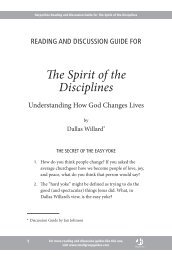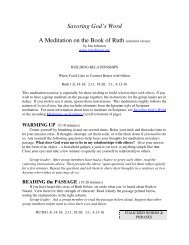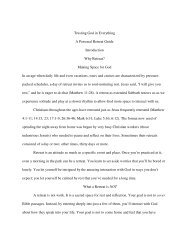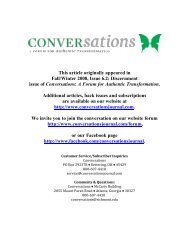FREE Download - Jan Johnson
FREE Download - Jan Johnson
FREE Download - Jan Johnson
Create successful ePaper yourself
Turn your PDF publications into a flip-book with our unique Google optimized e-Paper software.
After my sisters and I took Dad home, my sisters seemed at peace, but I felt keyed<br />
up inside. I went to the gym and played basketball extra hard. The sweat rolled down<br />
my back and my socks were soaked. I ran to the shower room.<br />
Alone in the shower, my feelings overcame me. What if my father had died? I felt<br />
so afraid and so alone. I cried uncontrollably as I had never done before in my life. The<br />
noise of the shower barely covered up my sobbing. I felt like the way I felt as a little boy<br />
knowing my father was killing himself with alcohol. There was nothing I could do then;<br />
there was nothing I could do now.<br />
I was crying for myself too. Where were my sisters when I needed them? As usual,<br />
they didn't know I was hurting because I couldn't share my sorrow with them. I wanted<br />
to talk to them and tell them how afraid I was, but I couldn't. That wasn't my role -- I was<br />
the placater. I had to grieve by myself. That's when I realized that the placater role was<br />
becoming too lonely a road to follow.<br />
Our roles hamper us in our relationships too. We can't stop playing our role with our<br />
spouse and friends. Responsible children often don't let their spouses carry their part of the load.<br />
Acting out children want their spouses to carry it all. Adjuster children won't talk about<br />
problems with their friends and placaters attempt to solve their friends' problems with simplistic<br />
solutions.<br />
Question your role-like tendencies in every situation. Instead of acting on automatic pilot in<br />
our roles, we can establish ongoing conversations with God asking if we're behaving in certain<br />
ways because God is leading this way, or because that's what our role demands of us.<br />
o The responsible child asks God, Am I helping this person because You, God, are leading me<br />
to do this? Because it gives me the kudos I need to feel loved?<br />
o The acting out child asks God, Am I creating a problem in my office because You have led<br />
me to see that someone needs to bring up this problem? Because I know it will get people's<br />
attention?<br />
o The adjuster asks God, Am I backing off from this friendship because You have shown me<br />
how this person is blocking my relationship with You? Because I'm scared to death to be<br />
close to her?<br />
o The placater needs to ask God, Am I listening sympathetically to this person because You<br />
have brought me into his life to be his friend? Because "fixing" people makes me feel<br />
important?<br />
Understanding our childhood role is a life-long process of seeking God's will for our lives<br />
and making different behavior choices. We may even "test the waters" by responding to others<br />
outside our roles and then waiting to see if God shows us that is more appropriate. As soon as<br />
we recognize our role-like behavior, we may want to go back and correct it. As difficult as it<br />
was for Dan, he called his oldest sister when he got home and told her how broken he felt about<br />
his dad. He knew that she was the responsible child of the family and would understand better<br />
than his other sisters how he tried to take care of people. He knew that she didn't understand<br />
everything he was saying, but it was important that he step out of his placater role by sharing his<br />
grief with someone else.



